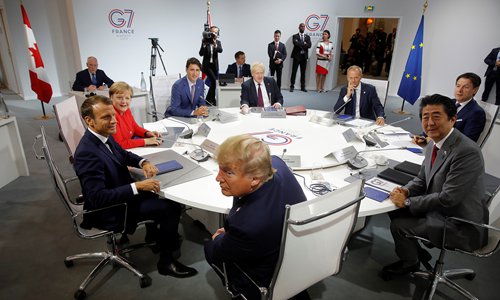HOME >> SOURCE
Global markets need more stimulus actions from G7
Source:Global Times Published: 2020/3/4 20:58:40

Leaders from the G7 group of countries and the European Council attend a working session on international economy and trade and the international security agenda in Biarritz, southwestern France on Sunday, the second day of the annual G7 Summit. Photo: AFP
In an attempt to support its economy, the US Federal Reserve (Fed) on Tuesday announced a rare 50-basis-point interest rate cut, the first such emergency move since the 2008 financial crisis.Yet, it just didn't generate the desired effect. Rather than comforting investors, the sudden rate cut pressed a panic button on financial markets already full of uncertainty and concerns over the global spread of the new coronavirus. US stock markets plummeted on Tuesday as the CBOE Volatility Index, a popular measure of stock market fear, went up. Meanwhile, the benchmark 10-year Treasury yield dropped below 1 percent for the first time in its history as investors scrambled to snap up safe-haven assets amid fears that things may be much worse than they look.
Worries about how bad the epidemic situation could be to force policymakers to make such a rare move may have weighed on market sentiment, but it is the lack of effective stimulus measures that has really failed the market.
Moreover, since the Fed's emergency action was announced just hours after a conference call among G7 finance ministers and central bank governors aimed at containing the economic damage of the epidemic, other G7 economies could also be expected to follow suit.
However, judging by the market reaction, easing monetary policy alone now seems far from enough to shield the global economy from potential disruptions caused by the coronavirus outbreaks around the world. So it is necessary for not just the US but all G7 economies to start preparing their economic rescue plans with stronger stimulus measures for the worst-case scenario.
This past February has seen how determined the Chinese government can be, not just when it comes to virus control but also in stabilizing its economy, with 3 trillion yuan ($431.5 billion) of liquidity injected into its financial system. As a result, China's financial markets have generally stabilized, and so has the country's epidemic situation. Morgan Stanley recently named China's equity markets as virus shelters, citing expectations of further policy stimulus.
However, China's stimulus alone won't be enough to stabilize global markets. Major economies like those in the G7 must also step up their economic policy responses to alleviate the risks to the global economy caused by the coronavirus.
First, the G7 economies should implement more measures on the prevention and control of the virus. The US is reportedly weighing covering the cost of treatment for uninsured coronavirus patients, which is a good development, but more actions are needed to help people get tested. Insufficient funding in this regard will lead to failure in controlling the epidemic, which will then translate into uncertainty over potential economic damage.
Second, global markets need more specific stimulus actions from governments amid the global virus spread. So far, the G7 economies have said they would "use all appropriate policy tools," but have yet to outline any details. Markets will regain confidence through actions, not words.
Posted in: GT VOICE